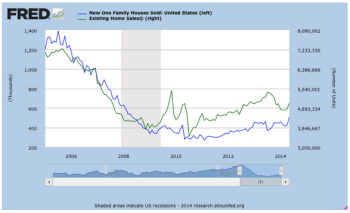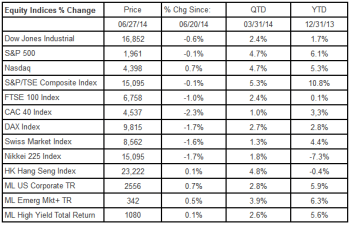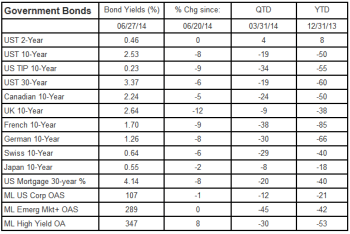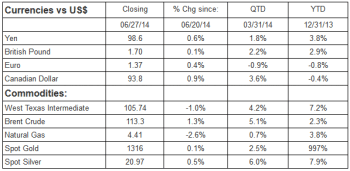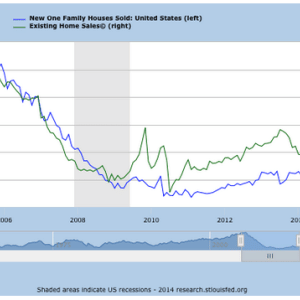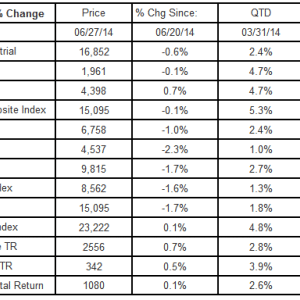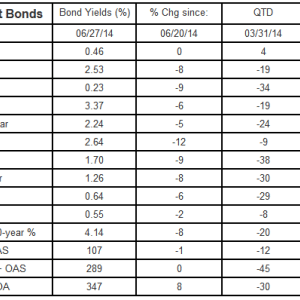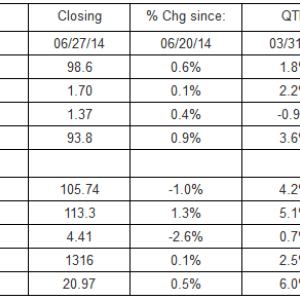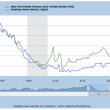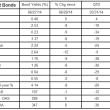John Davidson’s Economic Comments: Week ending June 27
The downward revision of U.S. GDP surprised the market, but more current economic measures in the U.S. were stronger. European releases were also softer. Equity prices declined and bond prices rose on the week. The Sunni-Shiite conflict in the Mid-east put upward pressure on Brent Crude and metals prices. The U.S. dollar was softer on the week.
Perspective:
Without the benefit of knowing what would happen on the very last day of June, the 30th, the Wall Street Journal published an article, Broad Market Gains Power Historic Rally. The article points out that, for the first time since 1993, commodities, bonds and stocks all posted positive returns for the first half of the year. According to the article, Gold rose 9.7%, followed by the Dow Jones UBS Commodity Index with a 8.1% increase. 30-year Treasuries gained 6.4%; the Dow Jones Industrials gained 1.7%; the MSCI World (developed) Index gained 4.8%, and the MSCI Emerging Market Index gained 4.3%.
Broadly speaking, the tables below support the contention of first-half gains across the board. Yet, their were some pockets of first-half losses in the Asian markets. Both metals and energy commodities gained, but currencies were mixed against the U.S. dollar the first half of the year. The VIX, a measure of stock volatility, averaged 13.8% the first half of 2014, well below the long term average of 20. The Central Banks' synchronized accommodation appeared to support all asset classes.
What does this mean? Well, at least the first half of the year having diversified asset class did not help investors since all asset classes rose. Yet normally all asset classes do not go up or down at the same time. So, asset diversification usually helps. What does it mean about the future or second half of the year, very little...
Economic Releases:
U.S. Housing picked up in May. Existing Home Sales (green in the chart) rose 4.9% to 4.89 million. New Home Sales (blue in the chart) rose to 504,000. Both releases were better than the range of expectations. New Home Sales hit a new post-Great-Recession high.
Other Economic Releases
The revision of the first-quarter U.S. GDP, to -2.9% was worse than the range of expectations. The downward revision of the consumer sector contributed significantly. Most economists discounted the first-quarter contraction as a one-time, weather-related, event inconsistent with stronger reports that have occurred in subsequent time periods. For instance: the Markit flash Purchasing Managers' Index for Manufacturing rose a point to 57.5 in June. The Conference Board's Consumer Confidence for June rose two points to 85.2; the University of Michigan's Consumer Sentiment Index rose a point to 82.5 in June. In May, Personal Income rose +0.4% while Spending rose +0.2%. For the week of June 21st, Initial Jobless Claims were little changed at 312,000 while the 4-week average of claims rose slightly to 314,250; Continuing Claims rose 12,000 to 2.571, but the 4-week average of Continuing Claims fell 13,000 to 2.587 million.
In the Eurozone, the PMI flash reports for Composite, Manufacturing and Services all slipped to 52.8, 51.9 and 52.8 respectfully, but remained in the expansion zone. The EU Economic Commission's Economic, Industrial and Consumer Sentiment each slipped in June. Germany's PMI's also slipped, but remained in expansion at 54.2, 52,4, and 54.8 for Composite, Manufacturing, and Services. Germany's Ifo Surveys eased similarly in June. France's PMI's fell further into the contraction zone at 48,0, 47.8, and 48.2 for Composite, Manufacturing, and Services. In the UK, 1st quarter GDP was unchanged at +0.8%,
Equities Markets:
Most equity markets sold off on the week on the softer economic data in Europe and the downward revision of U.S. GDP. Yet, approaching the end of the second quarter and end of the first half of the year, most equity markets maintained a positive return with Asian markets the exception. The Merrill Lynch Credit markets finished with strong first-half returns generated by falling interest rates and narrowing spreads.
Bond Markets:
Bond yields fell on the week, capping off a strong quarter and 1st half of the year. High yield credit spreads widened, but investment grade spreads were little changed on the week.
Currencies and Commodities:
The U.S. dollar was softer on the week, but mixed on the quarter and 1st half of the year. WTI Oil and natural gas prices fell, but the Sunni-Shiite conflict in the Middle East put upward pressure on Brent Crude and metals commodity prices.
John W. Davidson, CFA, started writing these Comments more than a decade ago as a personal discipline when he was promoted from portfolio manager to chief investment officer and CEO.

Most recently, he was the president of PartnerRe Asset Management Corporation, responsible for the management of PartnerRe's invested assets, which grew from $4 billion to $12 billion during his tenure. After joining PartnerRe in the fall of 2001, he hired the staff, built the trading floor and created the infrastructure to manage both fixed income and equity assets internally. He retired from PartnerRe at the end of 2008 and moved to Maine, where he focused on board work.
He has more than 35 years of industry experience, including positions with investment management responsibility for separate institutional accounts, mutual funds, trusts and insurance assets. Prior to joining PartnerRe, he served as president and chief executive officer of two other investment management companies. For various companies he has held positions as chief investment officer, chief economist, head of fixed income and portfolio manager. As a portfolio manager, Davidson managed and traded U.S. Government Securities as well as futures and options on fixed income instruments.
His real world experience is backed by a strong academic foundation, which includes earning a Master of Business Administration in finance and a Master of Arts in mathematics from Boston College, as well as a Bachelor of Arts, cum laude, in economics from Amherst College. He holds the professional designation of chartered financial analyst.
His experiences and credentials have brought him to the public as a television commentator and conference speaker. In addition to his frequent past appearances on CNBC, CNNfn, Bloomberg TV and Yahoo FinanceVision, he appeared as a special guest on Wall $treet Week with Louis Rukeyser. Reuters, Bloomberg and other business press services have quoted his views on the market. He has taught CFA preparation programs, as well as other courses offered by the Stamford and Boston CFA Societies, and the National Graduate Trust Officers' School.
Davidson is a natural leader in both his professional and personal life, having developed those skills early in his career as a naval officer. He spent three years on active duty, which included a year on the rivers of Vietnam, and 24 years in the Naval Reserve, from which he retired as a captain in 1994.
Davidson is treasurer and board member of the Camden Conference. He is also on the investment committee of the Pen Bay Health Foundation. He serves as an independent trustee for mutual funds.
In his leisure time, he is an active sailor, tennis player and skier. With his wife, Barbara, he renovated a 100+-year-old home in Camden, where they enjoy spending time with their two golden retrievers and having visits from their five children. He can be reached at jwdbond@me.com.
Event Date
Address
United States





